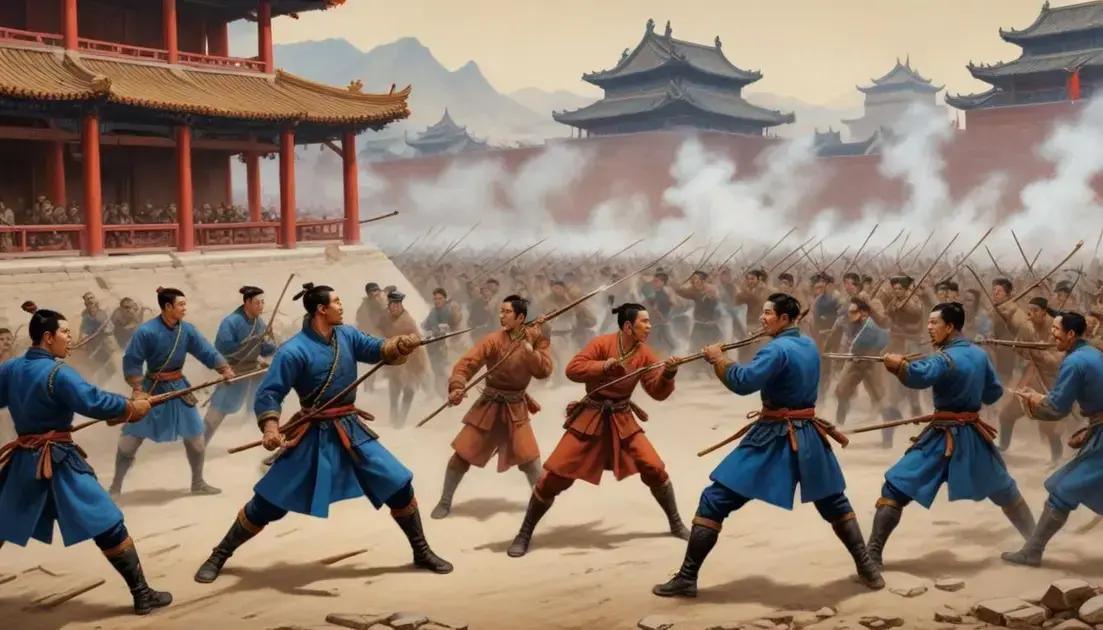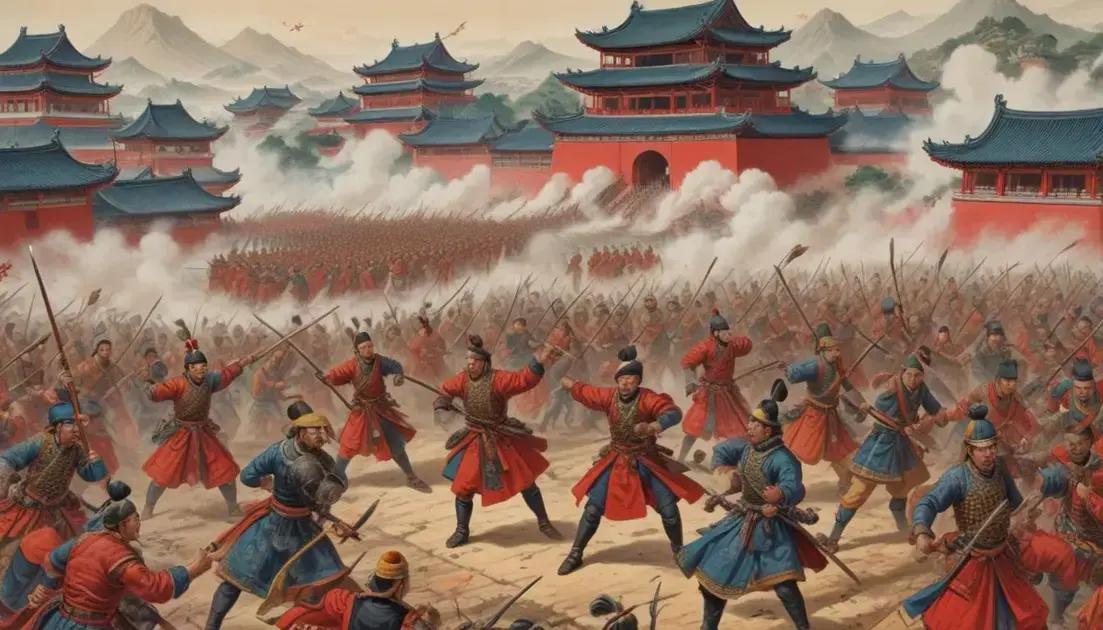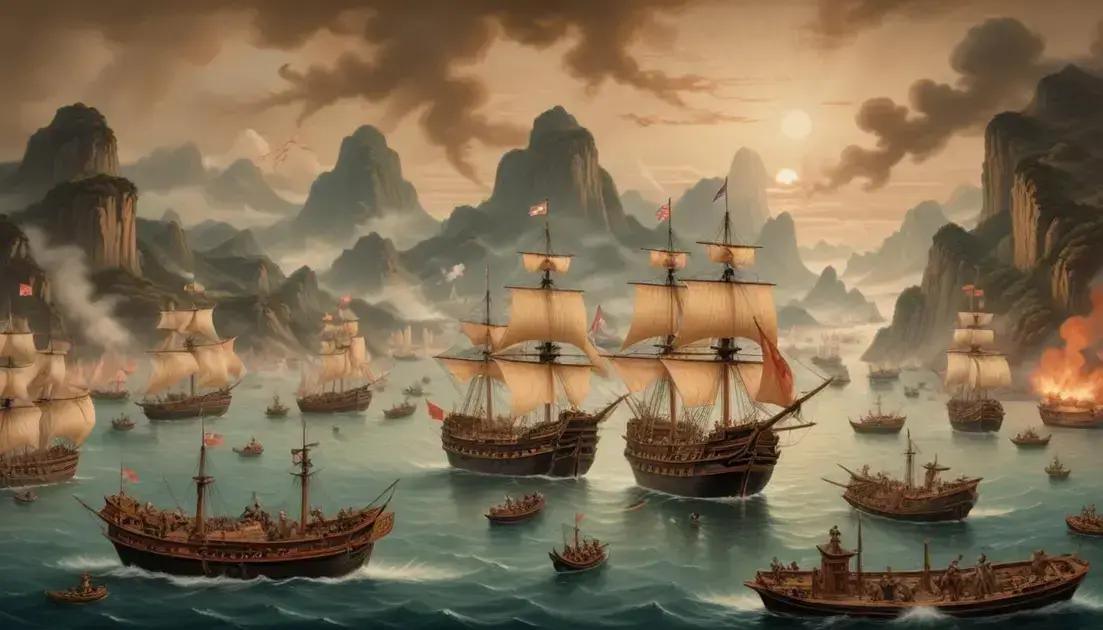
Boxer Rebellion: China Against Foreign Influences
The Boxer Rebellion, occurring in 1900, was a significant uprising in China against foreign influence and control. Driven by deep frustrations towards Western powers and the Qing dynasty’s weakness, the rebellion highlighted growing nationalism among Chinese people. Following its defeat, foreign nations imposed harsh penalties on China, leading to increased foreign control and ultimately fueling the call for modernization and reform. This uprising shaped China’s future relationships with foreign powers and left a lasting legacy of resistance and national pride.
The Boxer Rebellion serves as a dramatic chapter in China’s history, showcasing the fierce resistance against foreign encroachment. What drove this uprising, and what lessons can we draw from it today?
Historical Background
The background of the Boxer Rebellion is deeply rooted in China’s struggle against foreign influence and domination. In the late 19th century, various Western powers and Japan were expanding their control over China. This affected Chinese sovereignty and angered many citizens.
The Qing dynasty, which ruled China at the time, was weak and facing internal strife. Corruption and famine made life hard for common people. Many looked for ways to fight back against the foreign powers harming their country.
As conditions worsened, secret societies began forming. These groups sought to oppose foreign control and promote Chinese culture. One of these was the “Boxers,” officially known as the “Yihequan,” which means “Righteous and Harmonious Fists.” They believed they could protect China from foreign interference through martial arts and strong morals.
They claimed that their activities could invoke supernatural powers to ward off foreign devils. This belief fueled their confidence and rallied many supporters to their cause. As tensions grew, the movement turned violent, leading to clashes with foreign nationals and Chinese Christians.
In 1900, the Boxer Rebellion reached its peak. The Boxers laid siege to Beijing, targeting foreign embassies and Chinese converts to Christianity. Despite their intentions, this uprising would bring severe consequences, as foreign nations would soon intervene to suppress the rebellion and reinforce their control over China.
Key Events of the Boxer Rebellion
During the Boxer Rebellion, several key events shaped the course of history in China. It all kicked off in 1900 when Boxers began attacking foreign nationals and Chinese Christians. This violence reflected deep-rooted frustration among the Chinese people.
One of the first major incidents happened in June 1900. The Boxers besieged the foreign legations in Beijing. They surrounded these areas, hoping to drive out the foreigners and force the Qing government to take their side.
In response, the Eight-Nation Alliance was formed. This alliance included countries like Japan, the United States, Britain, and Germany. They decided to intervene to protect their citizens and interests in China.
July saw major fighting as foreign troops advanced toward Beijing. By early August, the alliance captured Tianjin, a crucial port city. This victory opened the door to move towards the capital.
On August 14, 1900, foreign forces finally entered Beijing. They faced intense resistance but eventually broke through the Boxer lines. This marked a turning point in the rebellion.
After capturing Beijing, the Eight-Nation Alliance began inflicting harsh punishments on those involved. The aftermath saw significant loss and suffering for Chinese civilians. Many lives were affected by the violence and destruction.
These events not only put an end to the Boxer Rebellion but also changed relations between China and foreign powers dramatically. The uprising highlighted the struggle within China and set the stage for future reforms.
Impact on Foreign Relations
The Boxer Rebellion had a huge impact on foreign relations for China. After the uprising, many countries became wary of China’s stability. The rebellion showed that foreign powers could not fully control the situation in China.
Following the Boxers’ defeat, the Qing dynasty faced criticism and pressure from global powers. The foreign nations involved demanded reparations. These reparations included payments for damaged property and compensation for losses incurred by their citizens.
China had to agree to the Boxer Protocol in September 1901. This agreement allowed foreign troops to station in Beijing and other key areas. This marked a significant loss of sovereignty for China.
Increased foreign influence led to more unrest among the Chinese people. The feeling of humiliation and defeat fueled nationalist sentiments. Many came to see foreign intervention as a threat to their culture and way of life.
This alienation from foreign powers would later lead to movements for reform and change within China. Activists began to call for modernization and a stronger national identity. These changes were essential for China as it moved into the 20th century.
The Boxer Rebellion and its aftermath shaped future relations. Countries became more cautious around China, realizing its potential as a rising power. These events laid the groundwork for China’s complex international relationships today.
The Aftermath and Legacy
The aftermath of the Boxer Rebellion was significant for China and the world. Many saw the rebellion as a failure, but it also sparked important changes. The Qing dynasty couldn’t recover its power after the uprising.
Following the rebellion, foreign powers imposed harsh penalties on China. The Boxer Protocol led to further foreign control over Chinese affairs. This angered many Chinese citizens and increased anti-foreign sentiments.
As a result, the nationalists grew stronger. They began calling for reforms. Many believed that China needed to modernize to stand up against foreign influence. This led to a series of movements, including the 1911 Revolution.
The legacy of the Boxer Rebellion is still felt today. It highlighted the tensions between tradition and modernity in China. It also showcased the struggles between foreign powers and the spirit of nationalism among the Chinese people.
Eventually, these tensions contributed to major events in Chinese history. This includes the rise of the Chinese Communist Party and the establishment of the People’s Republic of China in 1949. The Boxer Rebellion remains a powerful symbol of resistance against oppression in China.
Understanding the Boxer Rebellion helps us see how historical events shape modern society. It shows the importance of national pride and cultural identity. China continues to learn from its past as it navigates challenges in the world today.
Conclusion
In conclusion, the Boxer Rebellion played a crucial role in shaping modern China. It marked a turning point in the nation’s history, revealing the growing tensions between foreign powers and the Chinese people. The uprising highlighted the deep frustrations that many felt towards foreign influence.
This event not only led to significant changes in China’s government but also inspired a stronger sense of nationalism. As the country faced pressures from outside forces, it set the stage for future reforms and movements aimed at modernization.
Today, the legacy of the Boxer Rebellion serves as a reminder of the importance of cultural identity and self-determination. Understanding this historic uprising helps us appreciate the struggles and triumphs of nations as they seek to protect their interests in a globalized world. Ultimately, the events of 1900 remind us that history shapes our present and future in powerful ways.


